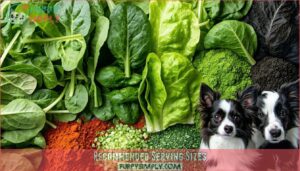This site is supported by our readers. We may earn a commission, at no cost to you, if you purchase through links.

However, it’s not without risks. Spinach contains oxalic acid, which can interfere with calcium absorption and may cause kidney problems if overfed.
Always steam or lightly cook spinach—raw spinach can be tough on their stomachs—and skip any salt, garlic, or onions. Start with small amounts and watch for any digestive upset or allergies.
Curious about how to include spinach safely in your dog’s diet? Proper preparation is key.
Table Of Contents
- Key Takeaways
- Nutritional Benefits of Spinach
- Can Dogs Eat Spinach
- Risks of Spinach Consumption
- Safe Preparation Methods
- Feeding Guidelines for Dogs
- Spinach in Dog Diets
- Consulting a Veterinarian
- Frequently Asked Questions (FAQs)
- Can dogs eat spinach leaves?
- Is it safe to consume spinach daily?
- Is Spinach good for dogs?
- Can a dog eat spinach too fast?
- Can dogs eat frozen spinach?
- How much spinach should a dog eat a day?
- How much spinach can I give my dog?
- Why can’t dogs have spinach?
- Is cooked or raw spinach better for dogs?
- What are the best vegetables for my dog?
- Conclusion
Key Takeaways
- Dogs can eat spinach, but only in moderation to avoid risks like kidney issues from its oxalic acid content.
- Always steam spinach before serving it to make it easier to digest and retain its nutrients.
- Avoid adding harmful seasonings like garlic, onion, or salt when preparing spinach for your dog.
- Start with small servings, monitor for any adverse reactions, and consult your vet for tailored advice.
Nutritional Benefits of Spinach
Spinach is packed with essential nutrients like vitamins A, C, and K, along with iron and fiber that support your dog’s overall health.
A nutrient-packed superfood, spinach boosts immunity, aids digestion, and promotes a shiny coat for your dog’s overall health.
These nutrients can boost immune function, improve digestion, and promote a shiny coat.
Vitamins and Minerals in Spinach
Spinach is packed with vitamins and minerals, making it a nutrient powerhouse for dogs.
It’s rich in vitamin A, vitamin K, and iron, all essential for healthy bones, blood, and immune support.
With its high mineral bioavailability and phytonutrients, spinach complements your dog’s regular diet.
Adding small amounts offers nutrient synergy, boosting overall dog nutrition and supporting essential functions without overloading calories.
Antioxidants and Fiber Content
Packed with antioxidants and fiber, spinach for dogs offers impressive benefits.
It supports immune health, aids digestion, and keeps your pup hydrated.
Here are key perks:
- Antioxidant Benefits: Boosts immunity.
- Fiber Digestion: Eases bowel movements.
- Spinach Superfood: Low-calorie treat.
- Immune Support: Fights free radicals.
- Hydration Effects: High water content.
Health Benefits for Dogs
When included in moderation, spinach offers several perks for dogs.
It promotes improved digestion with its fiber, enhances immunity thanks to vitamin C, and supports bone strength with vitamin K.
The antioxidants in spinach contribute to cancer prevention and coat health, giving your pup a shiny, healthy appearance.
Incorporating spinach into dog nutrition can truly support overall dog health.
Can Dogs Eat Spinach
Yes, dogs can eat spinach, but there are some details to keep in mind. While it’s not a necessary part of their diet, spinach can provide valuable nutrients when offered occasionally in small amounts.
Dogs can enjoy spinach as a nutrient-packed treat in small portions, boosting digestion, immunity, and coat health safely and deliciously.
It’s packed with vitamins and minerals that support overall health and digestion. Always prioritize moderation and proper preparation to maximize safety and benefits.
- Dogs can enjoy spinach as an occasional treat or diet supplement.
- Small portions of steamed spinach are easiest for digestion and nutrient absorption.
- Spinach acts as a "superfood" for dogs but isn’t a full diet replacement.
- Some breeds may display sensitivity, so introduce it slowly.
- Consider spinach alternatives like carrots or green beans for variety.
Risks of Spinach Consumption
Feeding your dog spinach comes with some risks, especially if given in large amounts.
Too much spinach can lead to digestive upset, calcium absorption issues, or even kidney problems over time.
Oxalic Acid and Kidney Damage
Oxalic acid in spinach can block calcium absorption, potentially leading to kidney stones and kidney damage in dogs.
While small amounts are generally safe, over time, oxalate toxicity may cause metabolic imbalance, muscle weakness, or more severe dog health concerns.
Always consult vet advice before adding spinach, especially if your pet has kidney issues or a sensitive system to toxic foods.
Excessive Consumption Risks
Feeding too much spinach to your dog can cause metabolic imbalance and calcium absorption issues.
High levels of oxalic acid may lead to kidney stones or bladder stones, causing kidney damage over time.
Long-term overconsumption might bring on muscle weakness or even respiratory paralysis.
Moderation is key—keep spinach as an occasional treat to avoid these risks.
Additionally, spinach boasts nutritional benefits for dogs, but should be carefully prepared to ensure safe consumption.
Digestive Upset and Allergic Reactions
If your dog experiences gut sensitivity, spinach intolerance might be the cause.
Vomiting symptoms, diarrhea causes, or allergic signs could point to digestive upset or food allergies.
Some dogs struggle with dog digestion, leading to an allergic reaction from spinach.
Always watch for unusual behaviors after feeding and avoid spinach if your pup has existing dog allergies or sensitivities.
Safe Preparation Methods
To safely prepare spinach for your dog, focus on cooking methods that retain nutrition and aid digestion, like steaming.
Always wash the leaves thoroughly and avoid adding harmful ingredients such as salt, garlic, or oil.
Steaming and Cooking Techniques
Steaming spinach is the best way to prepare it for dogs, preserving its nutrients while improving digestibility.
Compared to raw spinach, steaming enhances nutrient retention without making it too tough on digestion. Avoid boiled spinach, as it loses valuable vitamins.
Some owners even use steamer products for dogs to prepare healthy meals.
These cooking methods support your dog’s health, making steamed spinach a safer and more nutritious choice. Skip additives for best results.
Avoiding Harmful Ingredients
When preparing spinach for your dog, avoid hidden dangers like toxic additives.
Stick with safe alternatives to seasonings, and always check ingredient labels to confirm safety.
Add nothing harmful like garlic, onion, salt, or oil, as these toxic foods harm dogs.
Prioritize your pup’s kidney function by practicing portion control and consulting a vet for advice.
- **Avoid toxic seasonings.
- **Check for safe human foods.
- **Consult a vet about oxalates.
Washing and Chopping Spinach
To keep spinach safe for your dog, washing thoroughly is a must.
Remove dirt, pesticides, or bacteria that could upset their stomach.
Chop spinach into manageable pieces for easier digestion, whether you’re sticking with raw preparation or opting for cooked preparation like steaming.
Don’t forget stem removal—they’re tough to chew and digest, ensuring your dog eats spinach safely and benefits from its nutrients.
Raw spinach contains high oxalic acid, which can affect calcium absorption.
This is a crucial consideration to make spinach a healthy snack for your dog, and to ensure they can digest it safely.
Feeding Guidelines for Dogs
When feeding spinach to your dog, it’s important to stick to small, occasional portions to avoid potential health risks.
Always monitor your dog for any adverse reactions and consult your veterinarian for guidance on proper serving sizes, to ensure you are providing a safe and healthy experience for your dog, and avoid potential complications.
Recommended Serving Sizes
When feeding dogs spinach, portion size matters. Adjust based on breed and weight to guarantee safety.
- Extra-small dogs (2-20 lbs): 1/4 teaspoon
- Small dogs (21-30 lbs): 1/2 teaspoon
- Medium dogs (31-50 lbs): 1 teaspoon
- Large dogs (51-90 lbs): 1/2 tablespoon
- Extra-large dogs (91+ lbs): 1 tablespoon
Stick to these limits for balanced nutrition. Consider dog spinach guidelines for product options to ensure safe feeding.
Monitoring for Adverse Reactions
When your dog eats spinach, watch for digestive changes, allergic symptoms, or shifts in stool consistency.
Some dogs might face health concerns like kidney issues if spinach doesn’t sit well with them.
Health monitoring is key; when in doubt, schedule veterinary checkups to rule out problems.
A vet consultation guarantees spinach fits safely into your dog’s diet without risks.
Limiting Spinach Intake
Stick to portion control with spinach—too much can lead to digestive upset, calcium malabsorption, or issues from soluble oxalates.
Frequency matters; treat spinach as an occasional supplement rather than a regular meal.
Consider supplement alternatives if your dog shows breed sensitivity or individual tolerance concerns.
Is spinach safe? Yes, in moderation, it complements dog nutrition and offers benefits, but never overdo it.
Spinach offers benefits like improving digestion, which can be a valuable addition to your dog’s diet in limited amounts with the right supervision.
Spinach in Dog Diets
You can incorporate spinach into your dog’s diet through homemade meals or commercial dog food options.
Spinach may also work for vegetarian, vegan, or sensitive diets when prepared correctly and fed in moderation.
Homemade and Commercial Dog Food
Both homemade dog food and commercial options can include spinach, offering nutritional benefits like added fiber and vitamins.
With homemade benefits, you control ingredient sourcing and recipe variations, ensuring quality.
Commercial options, such as spinach dog food, are convenient and balanced for dog nutrition.
Many owners now explore recipes for their dogs.
Comparing cost and effort helps you decide which works best for your pet’s needs.
Vegetarian and Vegan Dog Diets
Exploring a vegetarian or vegan dog diet requires careful planning to meet your dog’s nutritional adequacy.
Spinach, a nutrient-packed vegetable, can complement this diet when prepared properly.
- Protein sources like lentils or chickpeas should offset spinach’s low protein content.
- Balance nutrients with supplementation needs for vitamins B12 and D.
- Address ethical considerations by consulting your vet for recipe ideas.
Puppies and Dogs With Sensitivities
For puppies or dogs with sensitive stomachs, spinach should be offered sparingly.
Its high oxalate content can raise kidney concerns, so portion control is key.
Always monitor for allergic reactions or digestive upset when adding spinach to a puppy diet.
Steamed spinach is easiest to digest, aligning with your dog’s dietary needs.
| Factor | Consideration |
|---|---|
| Age | Puppies need small amounts |
| Stomach Sensitivity | Use steamed spinach |
| Kidney Concerns | Avoid for predisposed dogs |
| Portion Control | Keep servings minimal |
Consulting a Veterinarian
If you’re considering adding spinach to your dog’s diet, it’s important to check with your veterinarian first.
They can provide specific advice based on your dog’s health, ensuring spinach is a safe and beneficial choice.
Personalized Feeding Recommendations
For personalized advice on adding spinach to your dog’s diet, talk to a vet. They’ll consider factors like breed specifics, activity levels, health conditions, and age.
Personalized plans guarantee spinach complements your dog’s dietary needs, providing health benefits without risks. Some breeds may even benefit from breed-specific food formulas to guarantee the best nutrition.
- Address unique dog dietary needs
- Identify dog health vegetable risks
- Get dog nutrition tips from experts
Health Considerations and Precautions
Spinach can benefit dogs, but certain health risks require caution.
Its high oxalate levels may form oxalate crystals, leading to kidney health concerns or even kidney failure.
Dogs with urinary issues or conditions affecting calcium absorption should avoid it.
Watch for allergic reactions or digestive issues.
Always consult your vet to assess toxicity levels and confirm it’s safe for your dog’s health conditions.
Ensuring a Balanced Dog Diet
A balanced canine diet supports your dog’s health, focusing on meeting calorie requirements and preventing nutritional deficiencies.
Spinach can complement vegetables in moderation, aiding hydration and providing nutrients.
Always consult your vet for dietary guidelines, especially before introducing spinach or supplements, as expert dog diet advice guarantees your dog’s nutritional balance, addressing specific needs and avoiding risks linked to dog nutrition spinach.
Frequently Asked Questions (FAQs)
Can dogs eat spinach leaves?
Yes, dogs can eat spinach leaves, but only in moderation.
Stick to steamed spinach for easier digestion, and avoid adding salt, oils, or spices.
Always consult your vet before adding spinach to your dog’s diet.
Is it safe to consume spinach daily?
Imagine giving your dog spinach daily, thinking it’s healthy.
While it’s nutrient-rich, excessive amounts can cause kidney issues due to oxalates.
Keep it minimal, maybe a few leaves weekly, and always consult your vet.
Is Spinach good for dogs?
It’s a healthy treat in moderation.
Spinach offers vitamins and nutrients, boosting your dog’s overall health.
But don’t overdo it—too much can cause kidney issues.
Stick to small portions and consult your vet first.
Can a dog eat spinach too fast?
If your dog eats spinach too fast, it could lead to choking or digestive discomfort.
Always chop spinach into small pieces, offer it in moderation, and monitor your dog’s reaction while they eat.
Can dogs eat frozen spinach?
Frozen spinach is safe for dogs if prepared properly.
Thaw and steam it to soften, making digestion easier.
Avoid seasoning, salt, or additives, and always feed in moderation and watch for any adverse reactions.
How much spinach should a dog eat a day?
Stick to small portions—about 1-3 tablespoons of steamed or chopped spinach per day, depending on your dog’s size.
Always introduce it slowly and watch for any reactions.
Consult your vet for personalized advice.
How much spinach can I give my dog?
Imagine giving your pup a handful of steamed spinach as a treat—perfect, right?
Stick to a tablespoon or two occasionally.
Too much can stress their kidneys, so moderation is key.
Always consult your vet!
Why can’t dogs have spinach?
Spinach isn’t toxic to dogs, but it’s high in oxalates, which can block calcium absorption and strain kidneys.
It’s safe in small amounts, but too much could lead to kidney issues or digestive upset.
Is cooked or raw spinach better for dogs?
Cooked spinach is better for dogs than raw because steaming preserves nutrients while making it easier to digest.
Raw spinach can be tough and harder on their stomachs.
Always serve plain, without spices or oils, and remember that steaming is key to preserving nutrients.
What are the best vegetables for my dog?
Think of vegetables as colorful patches in your dog’s balanced diet quilt.
Carrots, green beans, sweet potatoes, and broccoli shine as top picks.
Stick to small portions, skip seasonings, and always consult your vet!
Conclusion
Think of spinach as a small sprinkle of health rather than the main course for your dog.
Yes, dogs can eat spinach, but only in moderation and with proper preparation.
This nutrient-packed green offers vitamins, minerals, and antioxidants, but its oxalic acid can pose risks if overfed.
Always steam it, skip harmful additives, and start with small servings.
Monitor your dog for any adverse reactions and consult your vet to confirm spinach fits their balanced diet safely.

















